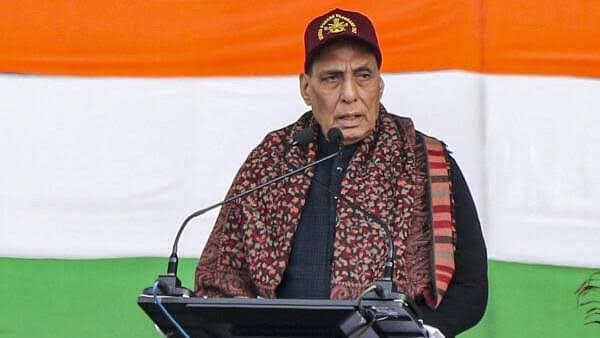India’s Defence Minister Rajnath Singh stated on Thursday that the International Atomic Energy Agency (IAEA) should take control of Pakistan’s nuclear weapons. His statement came days after the two nuclear-armed neighbors ended their most serious military conflict in nearly three decades.
Recent deadly fighting erupted between India and Pakistan after India conducted strikes on what it claimed were “terrorist camps” within Pakistan. This was in retaliation for an attack in Indian Kashmir last month that resulted in the deaths of 26 people, which India alleges was backed by Pakistan.
Islamabad denied these allegations. In the days that followed, both countries exchanged missiles and drones into each other’s airspace before reaching a truce on Saturday.
Read more: India, UAE in Sri Lanka Energy Deal
“Are nuclear weapons safe in the hands of such an irresponsible and rogue nation?” Singh questioned while addressing soldiers in Srinagar, the summer capital of Indian Kashmir. “I believe that Pakistan’s nuclear weapons should be taken under the supervision of IAEA.”
As of the time of reporting, there was no immediate response from Pakistan to Singh’s comments.
The IAEA, based in Vienna, is a U.N. watchdog responsible for monitoring nuclear programs to ensure they are used for peaceful purposes.
India and Pakistan became nuclear powers after conducting nuclear tests in 1998. Their long-standing animosity has made the region one of the most dangerous nuclear flashpoints in the world.
The latest military conflict between the South Asian neighbors escalated alarmingly, raising fears that nuclear arsenals might be deployed. Pakistan’s military stated that a top body overseeing its nuclear weapons would meet, but the Pakistani defence minister later clarified that no such meeting was scheduled.
Military analysts suggested that this may have been Pakistan’s way of hinting at its nuclear option, given its “first-use” policy if its existence is threatened in a conflict.
Indian Prime Minister Narendra Modi stated on Monday that India would again strike at terrorist hideouts across the border if there were new attacks on India, dismissing what he termed Islamabad’s “nuclear blackmail.”
Pakistan rejected Modi’s statements as “provocative and inflammatory assertions,” considering them a dangerous escalation.
India and Pakistan have fought three wars, two of which were over the Himalayan region of Kashmir. Both countries claim Kashmir in full but control it in part.
India accuses Pakistan of supporting Islamist militants fighting security forces in its part of Kashmir, an accusation that Islamabad denies.


